![Teaching in Malawi]()
Let me start with a disclaimer. I am not an expert in educational measurement, evaluation and assessment. These are highly specialised areas in educational research dealing with tests and examinations, and Malawi has quite a number of experts in the disciplines. My familiarity lies with curriculum, pedagogy, educational policy and teacher education. So my views in the ensuing discussion pertain to the policy implications of the decision, by the Malawi government, to abolish the Junior Certificate of Education (JCE), in the broader context of Malawi’s education system.
[caption id="attachment_95299" align="alignright" width="600"]
![Teaching in Malawi]()
Teaching in Malawi[/caption]
Several factors make the decision to abolish the JCE a monumental one. Debate on the JCE has been around for some time, although it was rather informal and sporadic. There have been research studies on educational assessment in Malawi, and a recommendation to abolish the JCE goes back to 2004, according to a study titledStudent testing and assessment reform done by Kadzamira, E., Moleni, K., Kholowa, F., Nkhoma, M., Zoani, A., Chonzi, R., and Chigeda, A.
According to a 2013 article by Dr. Bob Chulu, Dean of the Faculty of Education at Chancellor College, in the journal Assessment in Education: Principles, Policy & Practice, research studies in assessment have shown that school-based assessments are more effective than national examinations. The Malawi Government has been gradually evolving toward continuous assessment as a more effective mode of evaluating students.
Sooner or later, the JCE was going to be abolished, more for reasons of educational efficiency and the improvement of teaching and learning, than for economic exigency. It was only a matter of how and when to make the decision. Two questions now stare us in the face. First, whether the manner in which the decision has been arrived at has taken care of all the cautions issued and recommendations made by research studies. Second, where do we go from here?
As reported by the
Daily Times of
Monday21st September, the decision to abolish the JCE has come as part of the on-going Public Service Reform Programme (PSRP). Government ministries, agencies and parastatals are doing internal scrutiny and deciding for themselves how and what to reform. The suggestions are taken to the PSRP Commission, where they are further scrutinised and debated, before making a decision on them and passing it on to the president. What this means is that the changes announced last week came from MANEB itself. The president merely approved them, probably after being convinced, by way of the commission’s decision.
Writ large, the public service reforms are a much-needed and welcome change for Malawi. The country’s future depends on them. We cannot continue business as usual, lest we manifest Albert Einsten’s definition of insanity: doing the same thing repeatedly and expecting different results each time. As long as the internal process itself is systematic, consultative, and rigorous, we can rest assured of a process that will bear good fruit. Whether that indeed is the case will be known in due course.
Coming to the JCE question, a number of factors complicate the way in which the decision has been made. The first factor is that the reforms are happening at a time when the Malawi economy is undergoing severe problems. While it is true that necessity is the mother of all inventions, the danger in our circumstances is that institutions may be tempted to think of reforms dictated more by economic necessity than by the desire for wholistic efficiency. There is great risk here that the economic factors could triumph over common sense and end up skewing the reforms. This is not to question the timing of the reforms. It is the perfect timing. But the risk for skewed reforms needs to be taken seriously. In any case, and as Austin Madinga pointed out on his Facebook page, “it had to start somewhere.”
The second complicating factor is the efficiency, or lack of it, of our educational system. The majority of Malawians who start school dropout and never finish. About 900,000 enter school every year and after seven years about 700,000 drop out, according to government statistics (ESIP II, 2014). Only about 90,000 make it to secondary school yearly. This decision means that we will have millions of Malawians who attended some schooling but left with nothing to show for it. Countries that do not have the equivalent of the JCE tend to be countries whose dropout rates are negligible. Ours are some of the highest on the planet.
The idea of having people request for their Standard 8 transcript means that the majority will choose not to for reasons others have pointed out. It is true that both the Standard 8 and the JCE certificates are no longer valuable for employment. But this is based on faulty thinking, as I will explain in a moment.
The third factor relates to the message being sent about the value of education up to Form 3, as I have pointed out elsewhere. This is an unintended consequence concealed in the justification given for the decision to abolish the examination. The message to students, teachers and parents is that none of this education is important, until a student reaches Form 4. This reasoning emanates from what we could call, for lack of a better term, the kick-away-the-ladder syndrome.
The argument given by the government, that the JCE has lost its value and is not demanded by employers emanates from this syndrome. It can only be made after one has ascended to the roof and now thinks one no longer needs the ladder. So one kicks it away. The success is being mistaken for the path. The fact that you have now reached the roof does not mean you did not need the ladder all along. Sending this message about the value, or lack thereof, of education up to Form 3 can erode seriousness amongst students, teachers and parents. Though unintended, it is the wrong message to send.
The fourth factor is using employment demands to drive educational policy. This is a tricky one. While it is undeniable that employment is an overriding aim of education, focusing strictly on employment demands restricts the purposes of education. The purpose of education, as the late Tanzanian president Mwalimu Julius Nyerere pointed out in 1968, is to prepare students to thrive in and contribute positively to their society. People contribute to society in more ways than dictated by employment demands. Democratic citizenship is an equally important purpose of education, which should not play second fiddle to employment demands.
The fifth factor complicating this decision is the speed and volume of the changes. There have been no less than four major educational changes announced in a space of eleven days in September alone. And more are coming. There is a new secondary school curriculum now. There are new national educational standards. Many simultaneous changes could potentially send a shockwave through the education system. I don't envy the Ministry of Education officials, DEMs, PEAs and head teachers who have to implement all these radical changes all at once. We should consider introducing them in phases to allow for an orderly change management process.
In getting rid of the JCE, MANEB has offered continuous assessment as a replacement. Dr. Chulu observed, in his journal article, that continuous assessment was suggested to MANEB several years ago, and MANEB rejected it for reasons to do with security and reliability. Now that MANEB seems to have changed its mind, it is time to revisit the models suggested by assessment experts. Continuous assessment is not easy to conduct.
A pilot study done in Ntcheu in the early 2000s found that although it improved student performance, it was taxing. Teachers found it very demanding, especially in large classes. Teachers implementing continuous as part of the current Primary Curriculum and Assessment Reform (PCAR) have since complained that they spend more time filling forms and recording numbers than preparing for teaching. Rather than improve teaching and learning, this form of busy work has worsened matters.
Moving forward after the abolition of JCE will require meticulous caution. There will be need to consult widely, from students to teachers to parents and other stakeholders. Continuous assessment works in contexts where classes are small. The target of 60 students per teacher which Malawi has been aiming at for the past decade is far from the ideal, as anyone who has taught young people will testify. The only reason that ratio appears in our policy documents is because the status quo is unimaginable. We have perhaps the highest teacher-pupil ratios in the world. The official one appearing in policy documents, 1:78, is far from the reality on the ground. The national ratio obscures the true numbers in the lower grades.
Teachers need to be well educated, and resources need to be available for continuous assessment to succeed. A Zambian study on continuous assessment confirmed the problems caused by large classes and lack of teaching and learning resources (Kapambwe, 2010). It also identified student absenteeism and poor monitoring and feedback by district officials as other compounding factors.
These challenges are common to Malawi as well. If the money saved from these decisions does not go towards addressing the identified challenges and making conditions more conducive for continuous assessment, we will be courting worse disasters down the road.
There is a paradox about examinations. They influence teaching and learning because students, teachers and society tend to take them as the ultimate goal of education. They become self-reinforcing. This paradox extends to global educational role models. Finland, considered to have the best education system in the world, has only one national examination, taken at the end of secondary school. East Asia (China, Singapore, South Korea), which now produces the highest student performance scores in the world, relies on a heavy, punishing examination regimen. Some students commit suicide in the process.
A paradigm shift is underway in global education, moving from education for employment towards education for creativity and innovation. The rationale for this shift is that nobody can predict the world of the future, so it does not make sense to educate students for employment. Better to educate them for creativity and innovation so they can adapt their knowledge to solve problems unknown today.
There are good models Malawi can learn from. But removing the examinations without a careful, deliberate process could create a vacuum that could paralyse the system. We need to proceed very carefully and put in place long term plans, guided by meaningful consultations. Or else we will be solving a few problems while creating bigger ones.
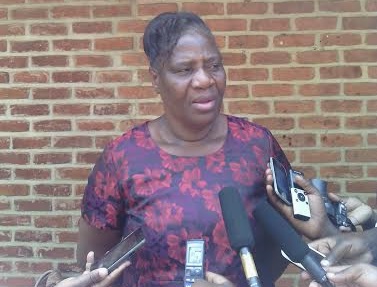
 Magreta: Fees introduced[/caption]
The Malawi Government through Ministry of Education, Science and Technology has introduced school fees in TTCs following the upward revision of school fees at various levels of education and abolition of policy of sponsoring students selected to Pubic Universities and Domasi College of Education in order to achieve cost sharing.
Secretary for Education, Science and Technology, Lonely Magreta, said students in Teacher Training Colleges will now be required to pay K105,000 fees per per year unlike in the previous years when they were not required to pay any fees. Instead of paying fees, they were receiving an allowance of K1,500 per month.
"The K105,000 fees per year per student is a mere 20% contribution to the actual cost of training" she said, "The K105,000 is actually lower than what other students pay for similar teacher training programmes which are offered by DAPP which charges K156,000 per student per year and no upkeep allowances are paid to the students."
However, Magreta said when the students will be conducting teaching practice during their second year of training , they will be entitled to an allowance of K20,000 per month which Government will be obligated to provide.
Like all arrangements made to all Needy Students selected to pursue courses at both Public and Private Universities and colleges, TCC students will have to apply for either loans or bursaries from the recently introduced Higher Education Students’ Loans and Grants which are being managed and administered by Higher Education Students’ Loans and Grants Board.
Magreta: Fees introduced[/caption]
The Malawi Government through Ministry of Education, Science and Technology has introduced school fees in TTCs following the upward revision of school fees at various levels of education and abolition of policy of sponsoring students selected to Pubic Universities and Domasi College of Education in order to achieve cost sharing.
Secretary for Education, Science and Technology, Lonely Magreta, said students in Teacher Training Colleges will now be required to pay K105,000 fees per per year unlike in the previous years when they were not required to pay any fees. Instead of paying fees, they were receiving an allowance of K1,500 per month.
"The K105,000 fees per year per student is a mere 20% contribution to the actual cost of training" she said, "The K105,000 is actually lower than what other students pay for similar teacher training programmes which are offered by DAPP which charges K156,000 per student per year and no upkeep allowances are paid to the students."
However, Magreta said when the students will be conducting teaching practice during their second year of training , they will be entitled to an allowance of K20,000 per month which Government will be obligated to provide.
Like all arrangements made to all Needy Students selected to pursue courses at both Public and Private Universities and colleges, TCC students will have to apply for either loans or bursaries from the recently introduced Higher Education Students’ Loans and Grants which are being managed and administered by Higher Education Students’ Loans and Grants Board.
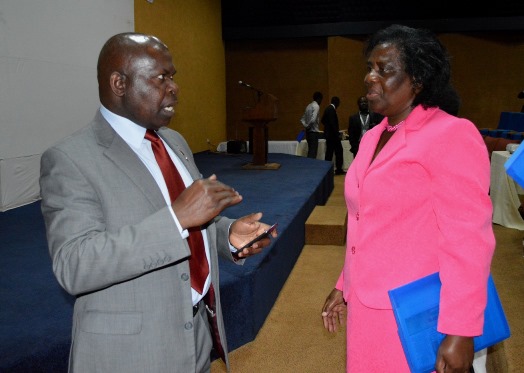
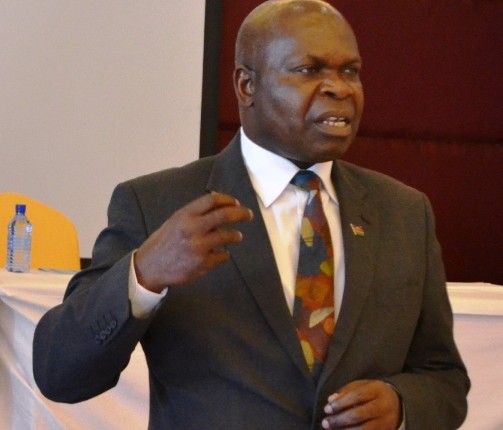

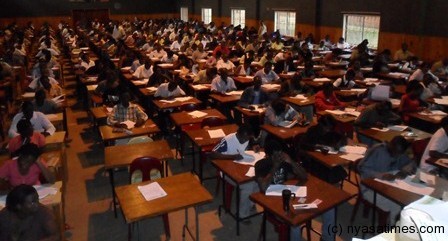 Exams time[/caption]
The benefits of abolishing JCE by far outweigh the cost of maintaining it. Those that are unhappy with the abolition have very good reasons and arguments, but what they are missing is that, what we benefit, even in terms of value, from JCE as a nation must substantially surpass the cost that our poor government annually invests in the Examinations.
And it is also highly imperative to consider the actual tradeoffs of spending hundreds of millions of tax on JCE, when we cannot afford decent salaries of the teachers, medicine, medical and educational facilities, etc, whose value outweighs JCE. Our economy is going through a delicate situation which needs serious fiscal thinking and proper prioritization.
I would like also to commend government for reviewing and raising tuition and boarding fees for public educational institutions and eliminating scholarships for tertiary institutions. This is a very brilliant fiscally sound and convenient decision.
It does not make sense for one of the poorest countries on earth, to be spending huge subsidies for public services. In as much as public services must be subsidized, this must be done with utmost caution and prudent calculations to avoid choking the growth of the economy as have always been the case.
Infact, government must seriously consider introducing some fees for public hospitals and clinics too. These are bold decisions that must be despite consequent political controversy which is inevitable when such decisions are made. Otherwise, how does a poor country finance huge subsidies? It does not make any economic sense, unless we are thinking politics.
However, government must also ensure that corruption and unnecessary spending are not tolerated at all levels and departments of government. Otherwise, the resources that will be saved through the new fiscal initiatives, will only end up in the pockets of selfish government employees and the elite of the ruling party.
So, come on Mutharika and DPP, fear and refrain from corruption and the systematic stealing of government resources through meaningless spending like taking more than 100 people for a UN General Assembly.
Exams time[/caption]
The benefits of abolishing JCE by far outweigh the cost of maintaining it. Those that are unhappy with the abolition have very good reasons and arguments, but what they are missing is that, what we benefit, even in terms of value, from JCE as a nation must substantially surpass the cost that our poor government annually invests in the Examinations.
And it is also highly imperative to consider the actual tradeoffs of spending hundreds of millions of tax on JCE, when we cannot afford decent salaries of the teachers, medicine, medical and educational facilities, etc, whose value outweighs JCE. Our economy is going through a delicate situation which needs serious fiscal thinking and proper prioritization.
I would like also to commend government for reviewing and raising tuition and boarding fees for public educational institutions and eliminating scholarships for tertiary institutions. This is a very brilliant fiscally sound and convenient decision.
It does not make sense for one of the poorest countries on earth, to be spending huge subsidies for public services. In as much as public services must be subsidized, this must be done with utmost caution and prudent calculations to avoid choking the growth of the economy as have always been the case.
Infact, government must seriously consider introducing some fees for public hospitals and clinics too. These are bold decisions that must be despite consequent political controversy which is inevitable when such decisions are made. Otherwise, how does a poor country finance huge subsidies? It does not make any economic sense, unless we are thinking politics.
However, government must also ensure that corruption and unnecessary spending are not tolerated at all levels and departments of government. Otherwise, the resources that will be saved through the new fiscal initiatives, will only end up in the pockets of selfish government employees and the elite of the ruling party.
So, come on Mutharika and DPP, fear and refrain from corruption and the systematic stealing of government resources through meaningless spending like taking more than 100 people for a UN General Assembly.
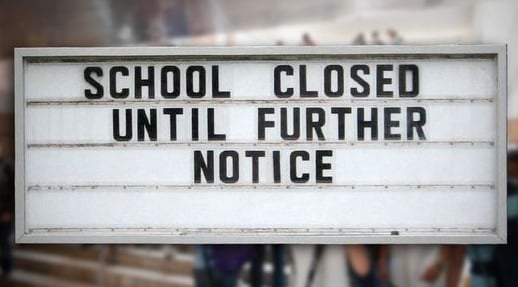

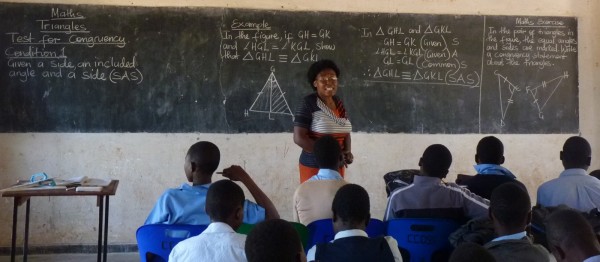 Teaching in Malawi[/caption]
Teaching in Malawi[/caption]
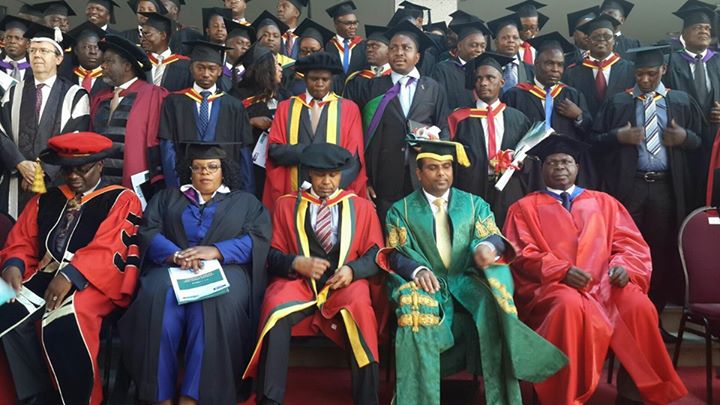

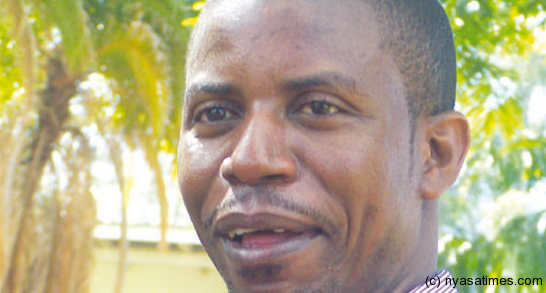 Kondowe: Education standards have gone down[/caption]
Director of Basic Education has been forced to make yet another refutation claiming there has not been any discussion in government over the matter.
The director Joseph Chimombo claimed the stories are false but sources say the introduction of the fees are part of reforms that the Peter Mutharika administration has embarked on.
"The stories are false" said Chimombo.
Learners in public primary schools pay an average of K2000 a year and most of them learn in crowded classes of 300 learners per class.
Education analyst Benedicto Kondowe said recently that education standards in Malawi are probably the lowest in Africa and President Mutharika assured the nation the government was doing all it can to improve the standards.
The government recently more than doubled school fees in secondary schools and introduced fees in teacher training colleges, a move education experts say it is retrogressive because of the state of the economy.
Kondowe: Education standards have gone down[/caption]
Director of Basic Education has been forced to make yet another refutation claiming there has not been any discussion in government over the matter.
The director Joseph Chimombo claimed the stories are false but sources say the introduction of the fees are part of reforms that the Peter Mutharika administration has embarked on.
"The stories are false" said Chimombo.
Learners in public primary schools pay an average of K2000 a year and most of them learn in crowded classes of 300 learners per class.
Education analyst Benedicto Kondowe said recently that education standards in Malawi are probably the lowest in Africa and President Mutharika assured the nation the government was doing all it can to improve the standards.
The government recently more than doubled school fees in secondary schools and introduced fees in teacher training colleges, a move education experts say it is retrogressive because of the state of the economy.

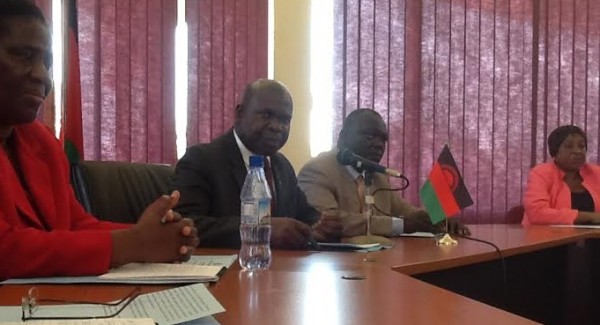 Ministry of education presser[/caption]
Director for Basic Education in the ministry, Dr Joseph Chimombo, who described the rumours as false, baseless and empty, argued during a press briefing that they are on intentions to reserve the free primary education policy.
"We have never discussed introduction of fees at primary school in the past 16 months. We cannot change the policy without proper consultations with stake holders," said Chimombo.
According to him, the claims came about because of the hiking of tuition fees in secondary schools.
"Primary Education is free,” he emphasized.
He said all children have the right to access education without any hindrance and no pupil should sent home or denied access to education for failing to contribute towards school development funds.
“We are aware that some teachers charge pupils in the name of Development fund and other activities. Such funds are helpful but pupils whose parents cannot pay should not be sent home," said Chimombo.
He also said no school is allowed to organize fee-paying extra lessons within school premises.
Ministry of education presser[/caption]
Director for Basic Education in the ministry, Dr Joseph Chimombo, who described the rumours as false, baseless and empty, argued during a press briefing that they are on intentions to reserve the free primary education policy.
"We have never discussed introduction of fees at primary school in the past 16 months. We cannot change the policy without proper consultations with stake holders," said Chimombo.
According to him, the claims came about because of the hiking of tuition fees in secondary schools.
"Primary Education is free,” he emphasized.
He said all children have the right to access education without any hindrance and no pupil should sent home or denied access to education for failing to contribute towards school development funds.
“We are aware that some teachers charge pupils in the name of Development fund and other activities. Such funds are helpful but pupils whose parents cannot pay should not be sent home," said Chimombo.
He also said no school is allowed to organize fee-paying extra lessons within school premises.

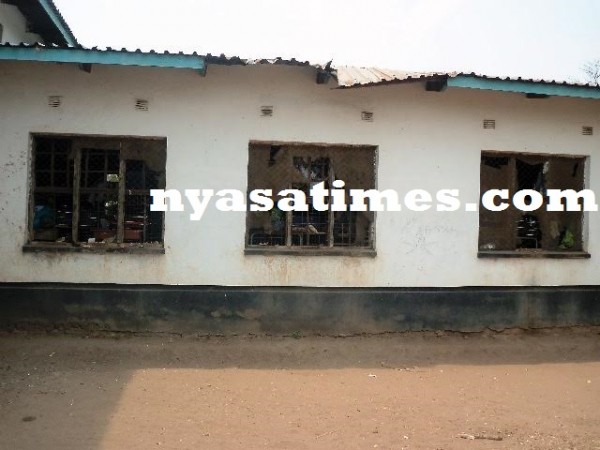 Chikwawa secondary school hostels[/caption]
[caption id="attachment_96791" align="alignright" width="455"]
Chikwawa secondary school hostels[/caption]
[caption id="attachment_96791" align="alignright" width="455"]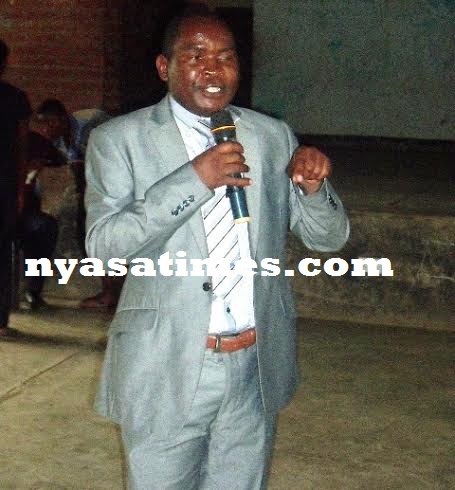 Rudi: School is not fit for purpose[/caption]
During the visit by the Alumni to the school recently, it was revealed that the school infrastructure is very old, classes’ condition is poor, the windows are broken, and the laboratory has nothing in it for experiment which most students find it very difficult to do science practical lessons.
“If students have to perform better we expect a provision of these things because even when we look at the library we have here in the campus, there are no books in it. The school is not fit for a boarding school and students are at risk according to the assessment we have made to the hostels, classes and many other places we have checked,” said Kingsley Norman Rudi, president of the Alumni Association.
He said “We have not come here as donors but we wanted to appreciate the situation students are going through and help voice out their concerns because we know and believe there are people out there, government and other companies who would wish to come and assist.”
Rudi said there was a need for the improvement of the school so that teachers as well as students were all motivated and committed to the school.
“We are going back to the drawing board and have strategic plan where we will look at a challenge one by one because we are worried also looking at the fact that the statistics indicate that this year no student has been selected to a university from the school and previous performances have not been very positive.
“But the major concern here is that the school has no fence which mostly puts the lives of our students at stake and thus as alumni we will firstly consider to make sure that security wise of the school is enhanced,” he added.
On their part, Godfrey Richard and Suzen Mitiwi both Chikwawa Secondary School prefects said the problems revealed were indeed issues of concern to the students at the school, adding the instutition has no car to refer student patients to the hospital which is at a distance of 2 Kilometers.
The students said during rainy season, the hostels lik which most of the time affect them and that the school has no borehole which would assist them when there is no running water from the taps a thing that negatively affect their health.
While acknowledging the problems faced by the institution, Head teacher of the school Flora Kaphamtengo said government was aware of the problems as her school received the inspection teams and that at any time to come, the school will undergo major rehabilitation works.
She said the coming in of the alumni was a welcome development as most students were motivated by most high official figures holding various positions both in government and other NGOs who form part of the association.
Kaphamtengo added:“The fact that we don’t have a fence should not make students misbehave but rather be responsible enough to police themselves.”
On top of the items the alumni gave to students such as 50 kilograms of rice, 28 crates of soft drinks and 7 goats they also organized lunch together with students.
Chikwawa Secondary School was opened in 1967 and according to reports it has never gone under any maintenance and has so far about 400 students.
Some of the officials that form part of the alumni association include; Simon Sikwese who is the Executive Director of Pakachere, Grain Malunga who is Senior Advisor of Paladin Africa, Steward Ligomeka Principal Secretary for Housing, Dr Geofrey Kananji Country Director of Alliance for Green Revolution in Africa, Dr Martin Mwayiponya owner of Heart for Life Hospital in Lilongwe as well as Professor Fanuel Lampiyawo who is Dean of Students at College of Medicine among others.
Rudi: School is not fit for purpose[/caption]
During the visit by the Alumni to the school recently, it was revealed that the school infrastructure is very old, classes’ condition is poor, the windows are broken, and the laboratory has nothing in it for experiment which most students find it very difficult to do science practical lessons.
“If students have to perform better we expect a provision of these things because even when we look at the library we have here in the campus, there are no books in it. The school is not fit for a boarding school and students are at risk according to the assessment we have made to the hostels, classes and many other places we have checked,” said Kingsley Norman Rudi, president of the Alumni Association.
He said “We have not come here as donors but we wanted to appreciate the situation students are going through and help voice out their concerns because we know and believe there are people out there, government and other companies who would wish to come and assist.”
Rudi said there was a need for the improvement of the school so that teachers as well as students were all motivated and committed to the school.
“We are going back to the drawing board and have strategic plan where we will look at a challenge one by one because we are worried also looking at the fact that the statistics indicate that this year no student has been selected to a university from the school and previous performances have not been very positive.
“But the major concern here is that the school has no fence which mostly puts the lives of our students at stake and thus as alumni we will firstly consider to make sure that security wise of the school is enhanced,” he added.
On their part, Godfrey Richard and Suzen Mitiwi both Chikwawa Secondary School prefects said the problems revealed were indeed issues of concern to the students at the school, adding the instutition has no car to refer student patients to the hospital which is at a distance of 2 Kilometers.
The students said during rainy season, the hostels lik which most of the time affect them and that the school has no borehole which would assist them when there is no running water from the taps a thing that negatively affect their health.
While acknowledging the problems faced by the institution, Head teacher of the school Flora Kaphamtengo said government was aware of the problems as her school received the inspection teams and that at any time to come, the school will undergo major rehabilitation works.
She said the coming in of the alumni was a welcome development as most students were motivated by most high official figures holding various positions both in government and other NGOs who form part of the association.
Kaphamtengo added:“The fact that we don’t have a fence should not make students misbehave but rather be responsible enough to police themselves.”
On top of the items the alumni gave to students such as 50 kilograms of rice, 28 crates of soft drinks and 7 goats they also organized lunch together with students.
Chikwawa Secondary School was opened in 1967 and according to reports it has never gone under any maintenance and has so far about 400 students.
Some of the officials that form part of the alumni association include; Simon Sikwese who is the Executive Director of Pakachere, Grain Malunga who is Senior Advisor of Paladin Africa, Steward Ligomeka Principal Secretary for Housing, Dr Geofrey Kananji Country Director of Alliance for Green Revolution in Africa, Dr Martin Mwayiponya owner of Heart for Life Hospital in Lilongwe as well as Professor Fanuel Lampiyawo who is Dean of Students at College of Medicine among others.

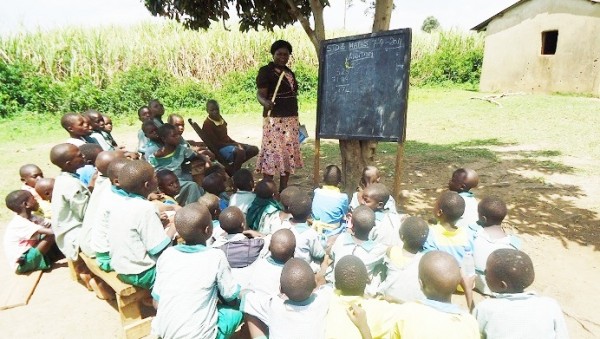 Teaching pupils under a tree which is used as their class[/caption]
She said Nkhata Bay used to be one of the districts that dominated in education performance in the country.
Chinthu said this over the weekend at Kalowa Primary School in the district during a meeting with her constituents.
She said: “We used to produce outstanding results from primary school to secondary school in the past, but what is happening now is worrisome since the results and other indicators are not impressive.”
Asked on the causes of the dwindling standards in education, the MP said there are multiple factors ranging from inadequate resources to learner attitude towards education.
Meanwhile, the MP has courted the Oller Gronhargen Foundation from Germany to help construct four school blocks in six schools and provide desks in the constituency.
Teaching pupils under a tree which is used as their class[/caption]
She said Nkhata Bay used to be one of the districts that dominated in education performance in the country.
Chinthu said this over the weekend at Kalowa Primary School in the district during a meeting with her constituents.
She said: “We used to produce outstanding results from primary school to secondary school in the past, but what is happening now is worrisome since the results and other indicators are not impressive.”
Asked on the causes of the dwindling standards in education, the MP said there are multiple factors ranging from inadequate resources to learner attitude towards education.
Meanwhile, the MP has courted the Oller Gronhargen Foundation from Germany to help construct four school blocks in six schools and provide desks in the constituency.

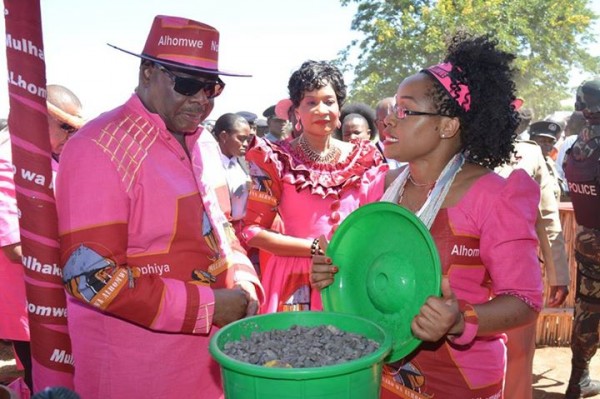 Mutharika at the Mulhakho event[/caption]
Mutharika expressed the concern during the Mulhako wa Alhomwe annual event Saturday at Chonde in Mulanje.
In some districts, only 10 per cent finish school. This is bad. We need to teach our children our cultural heritage as well as encourage them go to school," said the president who did not name the districts hit hard by the school dropout.
Paramount Chief Ngongoliwa, the head of the lhomwe chiefs, said at the function that children are no longer told to have sex as way of cleansing themselves after initiation ceremony due to the high prevalence rate of HIV and Aids and encouraging them to concentrate on their education.
At a different event in Zomba, principal secretary for the ministry of Gender Owen Luhanga said only 12 out of every 100 adults in Malawi know how to read and write, a situation he described as worrisome.
He said this calls for change of policy on adult literacy classes, saying the government has now directed that women and men should be taught in different classes to encourage more men attend the classes.
"Men tend to be shy. They don’t like learning with women," he said.
He said the government plans to place qualified teachers in adult literacy classes and place them on full monthly pay just like other teachers to motivate them.
He said among the youth, 75 out of every 100 are literate.
Mutharika at the Mulhakho event[/caption]
Mutharika expressed the concern during the Mulhako wa Alhomwe annual event Saturday at Chonde in Mulanje.
In some districts, only 10 per cent finish school. This is bad. We need to teach our children our cultural heritage as well as encourage them go to school," said the president who did not name the districts hit hard by the school dropout.
Paramount Chief Ngongoliwa, the head of the lhomwe chiefs, said at the function that children are no longer told to have sex as way of cleansing themselves after initiation ceremony due to the high prevalence rate of HIV and Aids and encouraging them to concentrate on their education.
At a different event in Zomba, principal secretary for the ministry of Gender Owen Luhanga said only 12 out of every 100 adults in Malawi know how to read and write, a situation he described as worrisome.
He said this calls for change of policy on adult literacy classes, saying the government has now directed that women and men should be taught in different classes to encourage more men attend the classes.
"Men tend to be shy. They don’t like learning with women," he said.
He said the government plans to place qualified teachers in adult literacy classes and place them on full monthly pay just like other teachers to motivate them.
He said among the youth, 75 out of every 100 are literate.

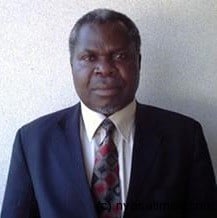 Minister of Education, Fabiano: Fee hike necessary[/caption]
The minister Emmanuel Fabiano assured Malawians that the increase in the fees is meant to improve education standards in public schools and provide equality in the payment of all public schools.
"For instance, students in national secondary schools were paying K1500 a term for boarding while others in day secondary schools were paying K25000 a term. What we have now done is to order that all students in other national or day secondary schools should pay K25000 a term," he said.
He also said each secondary school was at liberty to charge any amount for development fund but now there is a government order that schools should not charge more than K2500 per term and this money should only be demanded only if there is a development project at a school.
He said school fees is now pegged at K8000 that will be used to improve the teaching and learning services.
"We don't want to push all the cost to the tax payer this is why we have made this adjustment," said Fabiano, a former lecturer at Chancellor College, a constituent college of the University of Malawi.
Public schools face huge budgetary cuts in Malawi due to cash-flow problems at Capital Hill following the freezing of donor aid, among other factors.
Minister of Education, Fabiano: Fee hike necessary[/caption]
The minister Emmanuel Fabiano assured Malawians that the increase in the fees is meant to improve education standards in public schools and provide equality in the payment of all public schools.
"For instance, students in national secondary schools were paying K1500 a term for boarding while others in day secondary schools were paying K25000 a term. What we have now done is to order that all students in other national or day secondary schools should pay K25000 a term," he said.
He also said each secondary school was at liberty to charge any amount for development fund but now there is a government order that schools should not charge more than K2500 per term and this money should only be demanded only if there is a development project at a school.
He said school fees is now pegged at K8000 that will be used to improve the teaching and learning services.
"We don't want to push all the cost to the tax payer this is why we have made this adjustment," said Fabiano, a former lecturer at Chancellor College, a constituent college of the University of Malawi.
Public schools face huge budgetary cuts in Malawi due to cash-flow problems at Capital Hill following the freezing of donor aid, among other factors.
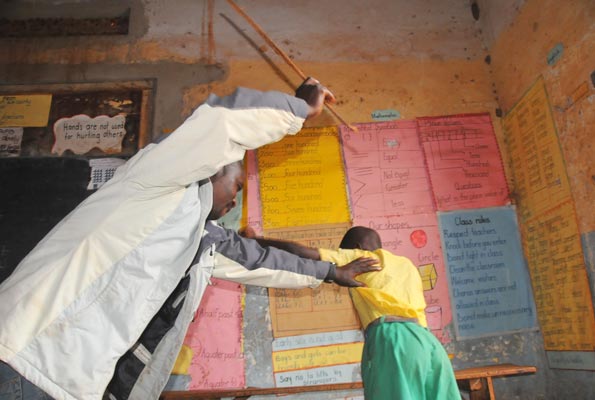

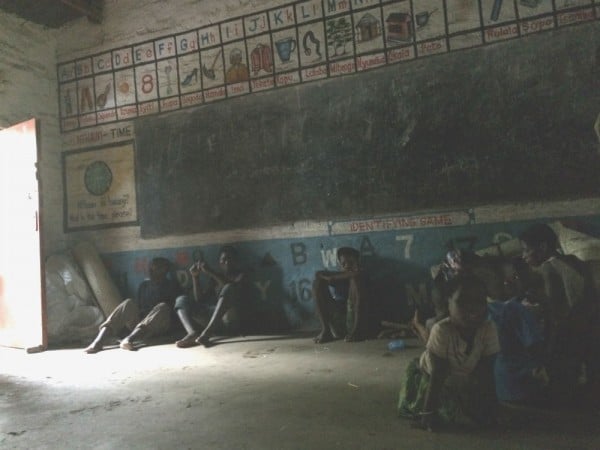 Malawi floods: A school becomes a home-Photo: Deborah Underdown/Concern/2015/Malawi[/caption]
District Education Manager Hendrix Likeke asked the department to e fully prepared for floods by having enough tents in case the floods strike again.
The call follows heavy rains in Blantyre, the upper Shire that usually leads to flooding in Lower Shire.
Likeke however said in case the department fails to provide tents in times of flooding, the education officials have no powers to turn away flood victims, saying that would be inhumane after all, government schools are pulic places.
"What concerns us is the negative effect on education for the learners. The January floods affected the learning process very much," he said.
He therefore said his office cannot get prepared for the floods as most of the times the circumstances are beyond the ministry of education prevention and control.
The district commissioner for Nsanje Atanazio Chibwana has since asked people who returned to low land to move back to upper land to avert the catastrophic tragedies that followed the January floods.
Malawi floods: A school becomes a home-Photo: Deborah Underdown/Concern/2015/Malawi[/caption]
District Education Manager Hendrix Likeke asked the department to e fully prepared for floods by having enough tents in case the floods strike again.
The call follows heavy rains in Blantyre, the upper Shire that usually leads to flooding in Lower Shire.
Likeke however said in case the department fails to provide tents in times of flooding, the education officials have no powers to turn away flood victims, saying that would be inhumane after all, government schools are pulic places.
"What concerns us is the negative effect on education for the learners. The January floods affected the learning process very much," he said.
He therefore said his office cannot get prepared for the floods as most of the times the circumstances are beyond the ministry of education prevention and control.
The district commissioner for Nsanje Atanazio Chibwana has since asked people who returned to low land to move back to upper land to avert the catastrophic tragedies that followed the January floods.

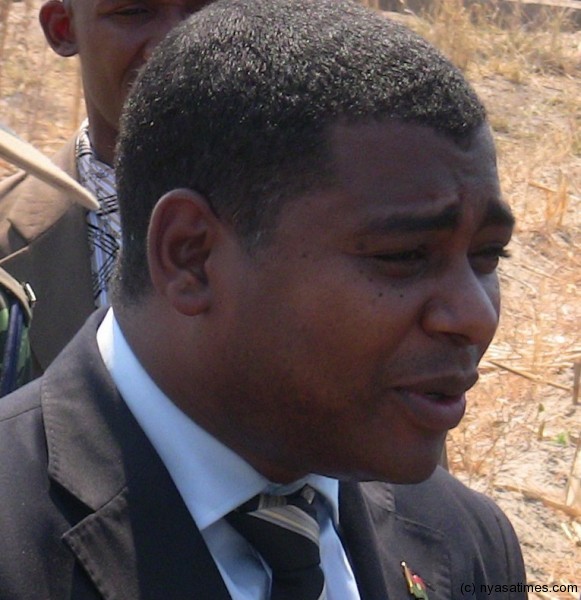 Jooma: The matter should have been debated[/caption]
The development forced the Second Deputy Speaker Clement Chiwaya to call for an early adjournment of the House proceedings degenerated into chaos with both sides failing to agree on how to proceed with Parliaments business.
Earlier, Minister of Education Science and Technology Dr Emmanuel Fabiano presented a ministerial statement which declared governments decision to increase school fees in secondary schools and abolishment of JC examinations.
Speaking after the ministerial statement Chiwaya guided the House that according to Parliamentary Standing Orders the statement was not subject to debate by members but rather only questions decision can be asked on the statement.
This did not go down well with the opposition who wanted the matter to be debated as it had far reaching consequences on ordinary Malawians.
Leader of Opposition Dr Lazarus Chakwera said as opposition they found it rather absurd that government decided to raise school fees in secondary schools when the country is going through the worst economic turmoil in living memory.
Chakwera argued that there were shortages of medical drugs in hospitals and majority of Malawians have no food at household level following the devastating floods and prolonged dry spells that hit the country last growing season.
"As opposition we feel that we will not ask any questions on the statement as this is a matter of national importance which could have been debated in this House to come up with a consensus. Suffice to say, we are registering that as the opposition we are not in favor of what is being proposed," said Chakwera amid handclapping from the opposition side.
However, Leader of the House Francis Kasaila argued against Chakwera sentiments saying Malawians were paying Primary Schools fees during the MCP era although the country was poor.
He was booed and jeered by the opposition side who called him unprintable names, generating the House into uncontrollable chaos.
Stubbornly Kasaila then moved a motion to waiver all relevant Standing Orders so that he should table government business.
And when Chiwaya put the question the opposition carried the day by refusing to go into government business upon which government side asked for division which calls for the House to vote on the decision to be taken.
The vote went in favour of government side and opposition suffered a humiliating defeat owing to absenteeism of its rank and file in the House.
This further accelerated name calling and jeers in the Chamber turning it into a kindergarten class situation, a development which forced Chiwaya to call for an early adjournment.
Speaking in an interview, Leader of Peoples Party (PP) Ralph Jooma concurred with Chakwera that the matter was supposed to be subjected to debate.
"This is a very bad year to raise school fees taking into consideration the economic turmoil the country is going through. Government raised the price of subsidized fertilizer while goods and services are going up every day. The question is where will Malawians get the money for the raised school fees," Jooma argued.
Jooma: The matter should have been debated[/caption]
The development forced the Second Deputy Speaker Clement Chiwaya to call for an early adjournment of the House proceedings degenerated into chaos with both sides failing to agree on how to proceed with Parliaments business.
Earlier, Minister of Education Science and Technology Dr Emmanuel Fabiano presented a ministerial statement which declared governments decision to increase school fees in secondary schools and abolishment of JC examinations.
Speaking after the ministerial statement Chiwaya guided the House that according to Parliamentary Standing Orders the statement was not subject to debate by members but rather only questions decision can be asked on the statement.
This did not go down well with the opposition who wanted the matter to be debated as it had far reaching consequences on ordinary Malawians.
Leader of Opposition Dr Lazarus Chakwera said as opposition they found it rather absurd that government decided to raise school fees in secondary schools when the country is going through the worst economic turmoil in living memory.
Chakwera argued that there were shortages of medical drugs in hospitals and majority of Malawians have no food at household level following the devastating floods and prolonged dry spells that hit the country last growing season.
"As opposition we feel that we will not ask any questions on the statement as this is a matter of national importance which could have been debated in this House to come up with a consensus. Suffice to say, we are registering that as the opposition we are not in favor of what is being proposed," said Chakwera amid handclapping from the opposition side.
However, Leader of the House Francis Kasaila argued against Chakwera sentiments saying Malawians were paying Primary Schools fees during the MCP era although the country was poor.
He was booed and jeered by the opposition side who called him unprintable names, generating the House into uncontrollable chaos.
Stubbornly Kasaila then moved a motion to waiver all relevant Standing Orders so that he should table government business.
And when Chiwaya put the question the opposition carried the day by refusing to go into government business upon which government side asked for division which calls for the House to vote on the decision to be taken.
The vote went in favour of government side and opposition suffered a humiliating defeat owing to absenteeism of its rank and file in the House.
This further accelerated name calling and jeers in the Chamber turning it into a kindergarten class situation, a development which forced Chiwaya to call for an early adjournment.
Speaking in an interview, Leader of Peoples Party (PP) Ralph Jooma concurred with Chakwera that the matter was supposed to be subjected to debate.
"This is a very bad year to raise school fees taking into consideration the economic turmoil the country is going through. Government raised the price of subsidized fertilizer while goods and services are going up every day. The question is where will Malawians get the money for the raised school fees," Jooma argued.